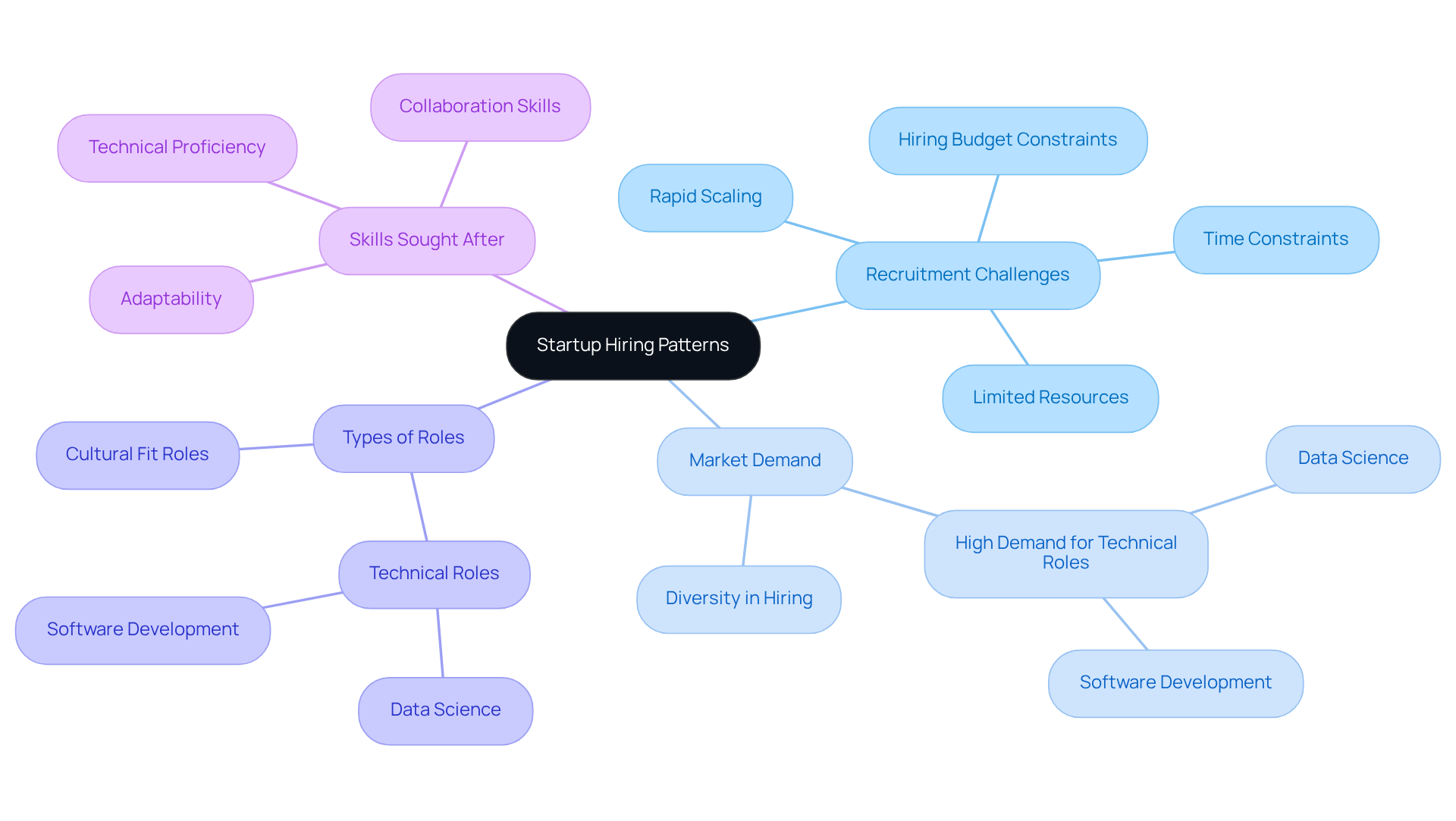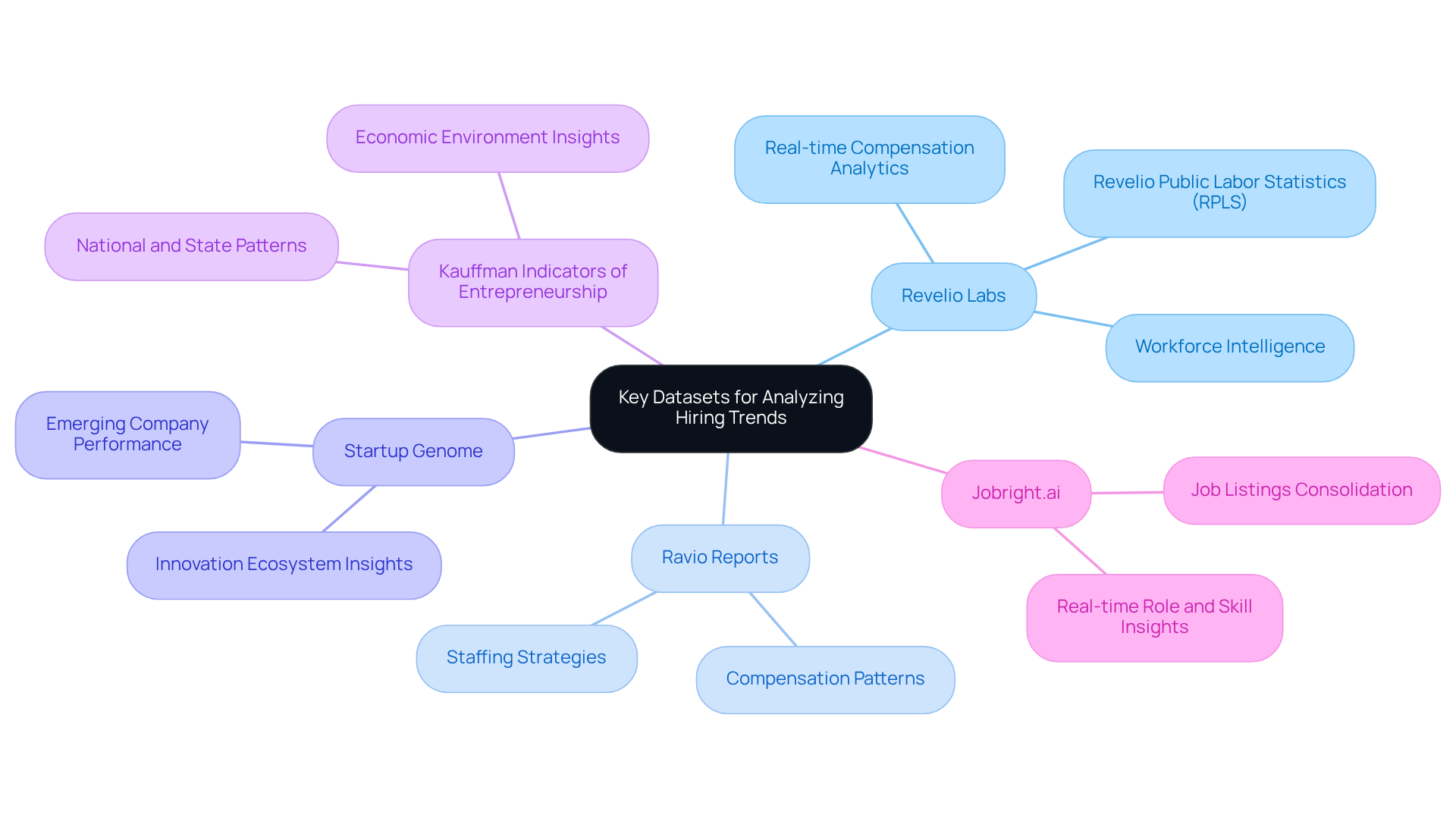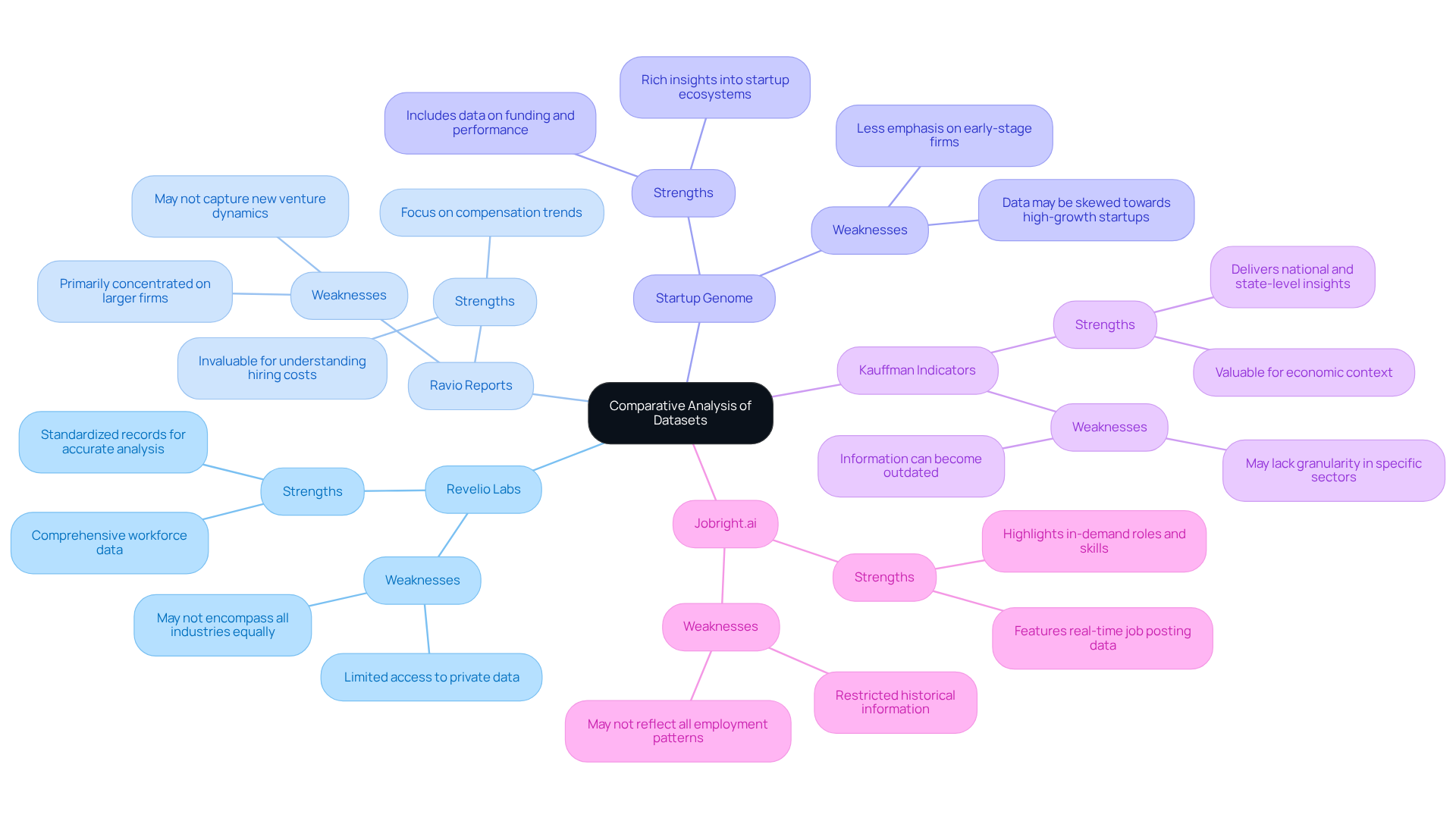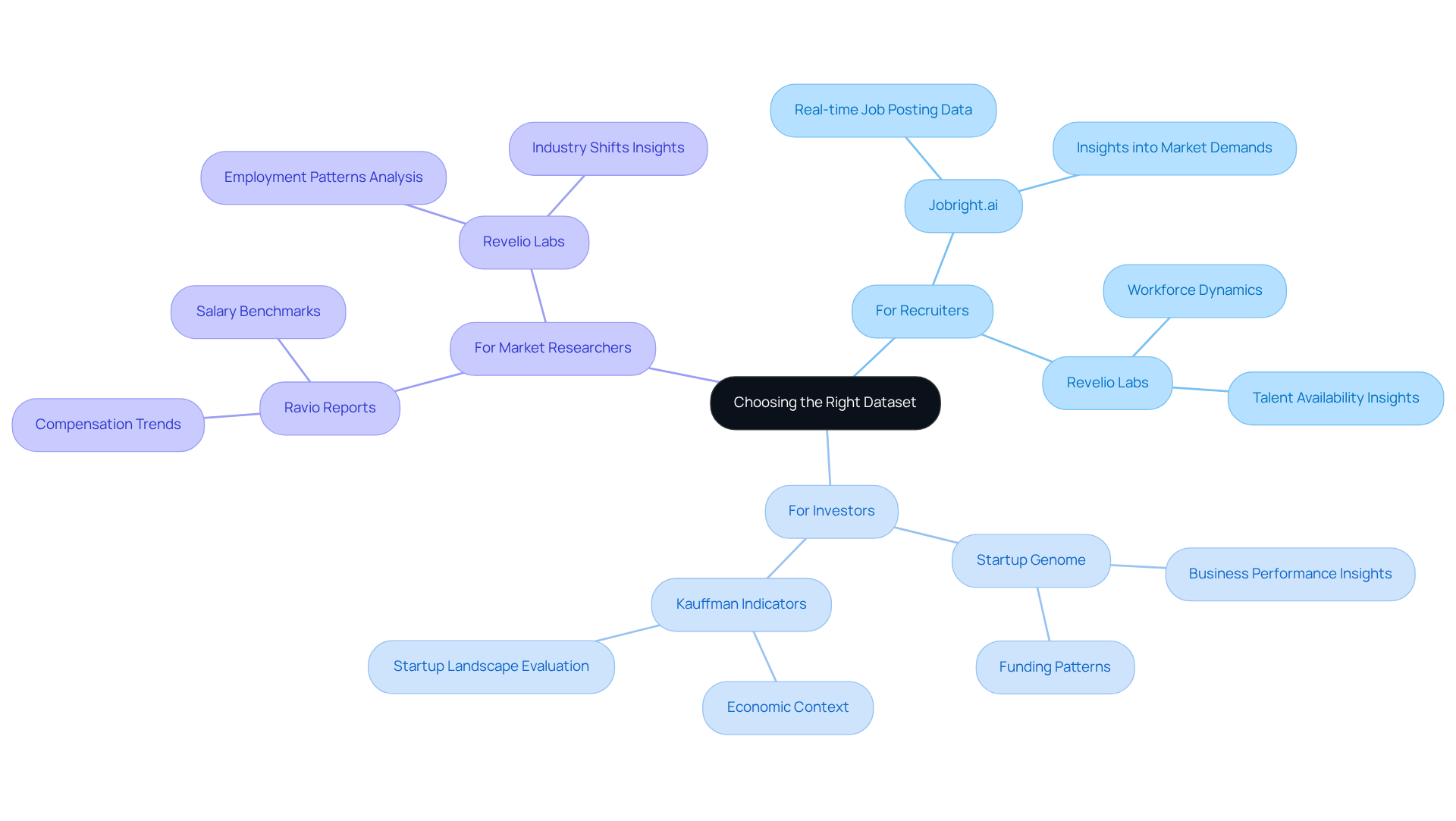Overview
The article presents a compelling analysis of various datasets that reveal startup hiring patterns, offering distinct insights into recruitment dynamics. It underscores the significance of datasets such as Revelio Labs and Jobright.ai, which deliver critical information on workforce intelligence and real-time job market demands. Such insights are essential for recruiters, investors, and market researchers aiming to make informed decisions in the ever-evolving startup landscape. By leveraging these resources, stakeholders can navigate the complexities of recruitment more effectively.
Introduction
Understanding the hiring patterns of startups is essential in today’s rapidly evolving business landscape, where agility and innovation reign supreme. Startups face unique recruitment challenges, from limited resources to the pressing need for swift scaling. In this context, datasets that illuminate these hiring trends emerge as invaluable tools for strategic decision-making. Yet, with a myriad of datasets available—each presenting its own strengths and weaknesses—how can organizations identify which sources yield the most pertinent insights tailored to their specific needs?
Understanding Startup Hiring Patterns
Startup recruitment patterns are shaped by various factors, including market demand, funding stages, and industry trends. Startups encounter unique recruitment challenges, such as limited resources and the necessity for rapid scaling. To analyze these patterns effectively, one must examine the most frequently filled, the duration of the hiring process, and the skills that are increasingly sought after.
Recent data indicates that technical roles, particularly in software development and data science, are among the most in demand, reflecting the ongoing digital transformation across industries. Furthermore, new businesses often prioritize cultural alignment and flexibility over extensive experience, fostering a diverse workforce capable of thriving in dynamic environments.
Consider companies like Mamaearth, which successfully secured over $110 million; they exemplify how startups can efficiently expand their recruitment processes while emphasizing diversity and innovation. As the business landscape evolves, understanding these recruitment trends is crucial for navigating the complexities of talent acquisition and ensuring sustainable growth.

Overview of Key Datasets for Analyzing Hiring Trends
Multiple important datasets are crucial in examining new business recruitment patterns, particularly those which datasets reveal startup hiring patterns, each offering distinct insights into employee dynamics. Notable examples include:
- Revelio Labs: This dataset delivers extensive workforce intelligence by standardizing millions of public employment records. It enables a thorough examination of recruitment trends across various industries. The recent acquisition of Salary Board enhances Revelio Labs' capabilities in providing real-time compensation analytics, essential for understanding how new businesses manage recruitment and compensation strategies. Furthermore, the Revelio Public Labor Statistics (RPLS) initiative addresses gaps in labor market information following updates from the Bureau of Labor Statistics (BLS), further supporting informed decision-making.
- Ravio Reports: Concentrated on compensation patterns, this dataset reveals how new companies manage recruitment and remuneration. It uncovers behaviors that can guide staffing strategies and assist organizations in attracting exceptional talent.
- Startup Genome: Focusing on the innovation ecosystem, this dataset provides essential information on emerging company performance, funding, and recruitment practices. It serves as an invaluable resource for investors and entrepreneurs aiming to comprehend market dynamics.
- Kauffman Indicators of Entrepreneurship: This dataset showcases national and state patterns in new employer businesses, offering insights into the wider economic environment that impacts new business employment behaviors.
- Jobright.ai: By consolidating job listings and employment information, this dataset provides real-time insights into the most sought-after roles and skills within the startup sector. It assists organizations in aligning their recruitment efforts with market demands.
Understanding the unique contributions of these datasets, which datasets reveal startup hiring patterns, is essential for effectively and making strategic recruitment decisions. The insights derived from these datasets can be applied to refine recruitment strategies, ensuring that organizations are well-positioned to attract and retain top talent in a competitive landscape.

Comparative Analysis: Strengths and Weaknesses of Each Dataset
The following is a comparative analysis of key datasets that are essential for informed decision-making:
- Dataset: Revelio Labs
Strengths: Offers comprehensive workforce data; standardized records ensure accurate analysis.
Weaknesses: Limited access to private data; may not encompass all industries equally. - Dataset: Ravio Reports
Strengths: Focuses on compensation trends; invaluable for understanding hiring costs.
Weaknesses: Primarily concentrated on larger firms; may not capture new venture dynamics. - Dataset: Startup Genome
Strengths: Provides rich insights into startup ecosystems; includes data on funding and performance.
Weaknesses: Data may be skewed towards high-growth startups; less emphasis on early-stage firms. - Dataset: Kauffman Indicators
Strengths: Delivers national and state-level insights; valuable for economic context.
Weaknesses: May lack granularity in specific sectors; information can become outdated. - Dataset: Jobright.ai
Strengths: Features real-time job posting data; highlights in-demand roles and skills.
Weaknesses: Restricted historical information; may not reflect all employment patterns.
This comparative analysis underscores that while each dataset boasts , they also present limitations that users must carefully consider when selecting a dataset tailored to their specific needs.

Practical Applications: Choosing the Right Dataset for Your Needs
Selecting the right dataset is crucial, aligning directly with the specific needs and objectives of the user.
For Recruiters: To effectively identify talent and analyze hiring trends, Jobright.ai emerges as a leading choice, offering real-time job posting data that delivers immediate insights into market demands. Furthermore, Revelio Labs provides valuable information on workforce dynamics, enabling recruiters to grasp shifts in talent availability and essential skills.
For Investors: Those assessing new business viability must leverage Startup Genome, which offers extensive insights into business performance and funding patterns—key elements for making informed investment decisions. The Kauffman Indicators further enrich this perspective by providing critical economic context, allowing investors to evaluate the broader landscape in which startups operate.
For Market Researchers: Ravio Reports prove beneficial for comprehending compensation trends, delivering insights into salary benchmarks across diverse sectors. In addition, Revelio Labs offers a comprehensive view of workforce intelligence, empowering researchers to analyze employment patterns and industry shifts effectively.
Ultimately, the dataset selected must align with the user's , ensuring that the insights derived are not only actionable but also relevant to their specific objectives.

Conclusion
Understanding the intricacies of startup hiring patterns is essential for navigating the competitive landscape of talent acquisition. Startups encounter unique recruitment challenges, driven by the imperative for rapid scaling and a preference for cultural fit over extensive experience. By examining the roles in demand and the datasets that reveal these trends, organizations can strategically position themselves to attract the right talent.
Key datasets, including:
- Revelio Labs
- Ravio Reports
- Startup Genome
- Kauffman Indicators
- Jobright.ai
each provide distinct insights into hiring trends and compensation patterns. Their respective strengths and weaknesses offer a nuanced understanding of the data landscape, enabling recruiters, investors, and market researchers to make informed decisions tailored to their specific needs. This comparative analysis emphasizes the critical importance of selecting the right dataset to align with strategic goals, ensuring that insights are both actionable and relevant.
In a rapidly evolving job market, leveraging the appropriate datasets for startup hiring analysis can significantly enhance recruitment strategies. Organizations must remain proactive in understanding hiring trends and adapting to industry demands. By utilizing these insights, startups can cultivate a diverse and skilled workforce that not only meets current needs but also drives sustainable growth in the future.
Frequently Asked Questions
What factors shape startup hiring patterns?
Startup hiring patterns are influenced by market demand, funding stages, and industry trends.
What unique challenges do startups face in recruitment?
Startups often deal with limited resources and the need for rapid scaling, making recruitment particularly challenging.
What aspects should be analyzed to understand startup recruitment patterns?
To analyze startup recruitment patterns, one should examine the types of roles frequently filled, the duration of the hiring process, and the skills that are increasingly in demand.
Which roles are currently most in demand in startups?
Technical roles, particularly in software development and data science, are among the most in demand due to ongoing digital transformation across industries.
What hiring priorities do new businesses typically have?
New businesses often prioritize cultural alignment and flexibility over extensive experience, aiming to create a diverse workforce that can thrive in dynamic environments.
Can you provide an example of a startup that has successfully expanded its recruitment process?
Mamaearth is an example of a startup that secured over $110 million and efficiently expanded its recruitment processes while emphasizing diversity and innovation.
Why is understanding recruitment trends important for startups?
Understanding recruitment trends is crucial for navigating the complexities of talent acquisition and ensuring sustainable growth as the business landscape evolves.




